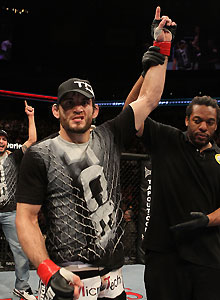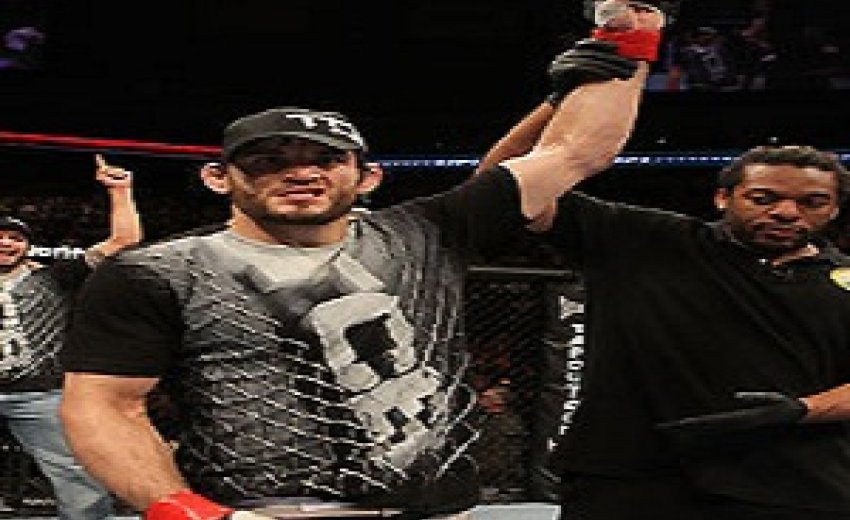SAN JOSE, Calif. – When Jon Fitch signed his first contract with the Ultimate Fighting Championship in 2005, the former Purdue University wrestling captain could suddenly afford to eat whatever he wanted.
That meant meat. Lots of it.
“I would eat three meals a day with meat, and meat was the main part of every meal,” said Fitch, who is preparing for his biggest fight in years on Feb. 26 in Sydney, Australia against B.J. Penn in UFC 127. “I’d eat two steaks for dinner almost every night.”
 |
| Jon Fitch has dropped meat from his diet as he prepares for his UFC 127 main event against B.J. Penn. (Getty Images) |
Fitch, considered by most either the No. 2 or No. 3 welterweight in the world, grew up in the meat-and-potatoes Midwest in Fort Wayne, Ind. When he went to college, meat became an even bigger dietary staple.
“My mother would make meat and sides, but in college, I was always in a hurry, so cooking meat was quick and easy, and there were a lot less sides,” he said. “I lived off the George Foreman Grill.”
But after college and before signing with the UFC, meat became a luxury. As a small-show fighter living in expensive San Jose, he had to survive on a budget of $800 a month, which didn’t get him very far.
Ramen noodles were in. High-priced animal flesh was out.
But in his training for the Penn fight, Fitch has come full circle. The top welterweight has joined a growing number of MMA stars who have committed to a vegetarian diet.
The list includes the next challenger for Georges St. Pierre’s welterweight title, Jake Shields, Strikeforce welterweight champion Nick Diaz, and two former Ultimate Fighter winners, Nate Diaz and Mac Danzig.
Shields, whose parents are vegetarians, grew up on a meatless diet, never wavered, and is in large part the catalyst for the trend.
He influenced training partner Nick Diaz. Nate Diaz, Nick’s younger brother, followed in Nick’s footsteps. Fitch, based in San Jose, and Shields, who lives nearby in San Francisco, have trained together in the past.
“I’ve been this way all my life,” said Shields, 32, who faces St. Pierre on April 30 in Toronto on a show that has already sold out the 55,000-seat Rogers Centre. “I’ve got nothing to compare it to. The only thing is, nobody can train as hard or as long as me and Nick Diaz, so that seems to indicate something.”
Diaz, 27, turned to a vegetarian diet as a teenager. Unlike Shields and Fitch, who live in the upscale Bay Area, Diaz lives in working-class Stockton, Calif. This means his diet require a substantial commitment, as he noted he has to load up on groceries when he goes to train with the likes of Shields in San Francisco, an hour away from his home.
Frequent shopping and constant eating are a necessity in balancing the vegetarian lifestyle and high-level professional fighting, because foods with no preservatives spoil quickly, and maintaining weight and strength are necessary.
“I try to keep my diet all organic,” said Diaz. “It’s healthier. You recover faster. Nobody trains as hard as we do.” With plenty of vegetarian restaurants in San Francisco, Shields eats out several times per week.
Shields noted the only time his diet became difficult was when he was in Strikeforce and bounced back and forth between welterweight and the 185-pound welterweight class. When he competed at the higher weight class, he sometimes had to force himself to eat seven or eight times a day to add the extra weight.
At the top level of MMA, particularly for main-event caliber UFC fighters, a good deal of travel is required, which can be a particular challenge to those with vegetarian needs.
Fitch went to Sydney several weeks ago for a media tour to promote UFC 127, and will leave more than a week in advance of his fight to get acclimated to the substantial time change. Jake Shields is a lifelong vegetarian. His biggest dietary challenge is finding good eats on the road.
“Eating there won’t be a problem,” Fitch said. “I was there in December and scouted out places for the week of the fight.”
Shields spent last week in Toronto in promotion of his fight. He’s fought all over the world and noted having problems finding good places to eat on fight week in some cities.
Early in his career, Shields fought frequently in Japan, which was a struggle, because so much of the Japanese diet is fish-based, and he didn’t speak the language. Shields said at times he didn’t eat as well as he would have liked in the days leading to a fight, and didn’t feel his best. Even with the challenge, Shields only lost one fight while competing in Japan.
Husband-and-wife team
Fitch’s transformation to vegetarianism came about in large part to the influence of his wife Michele. He noted that Shields, who has won 15 consecutive fights, helped sway his decision.
And he couldn’t be happier with the changes.
“In every kind of testing to see where I’m at, strength, speed, conditioning, I’m either right at or well ahead of the best marks I’ve ever had at this stage of training,” Fitch said. “A few weeks ago, we were concerned I was peaking too fast. I’d kick the [expletive] out of myself at the same stage of training for any of my previous fights.”
Fitch, who turns 33 on Feb. 24, is now about 183 pounds. As a welterweight fighter, his weigh-in weight is 170. Most modern welterweights range from 185 pounds as their regular weight before cutting down, to as much as 210 pounds for somebody like Anthony “Rumble” Johnson. Fitch was on the upper end of that scale for years. But two weeks before the Penn fight, he was about five pounds lighter at the same stage as he would have been for his last few fights.
“The biggest thing is better recuperation from training,” Fitch said. “I don’t have the days where I came in flat. It’s made for the best training camp of my career.”
If anything seems like a negative with Fitch in regard to his change, it’s that he has to constantly eat or he will lose too much weight.
Both Fitch and Shields augment their diets with frequent protein shakes. Fitch has limited his supplementation to plant-based protein of late, and is also using amino acids as a supplement. Shields uses supplements supplied by his sponsor, usually soy- or whey-based, but sometimes milk-based protein.
Neither fighter is vegan. Fitch said during his Penn camp he has been eating fish about once a week, although he went three straight weeks at one point with no animal products. Besides his milk-based protein powder, Shields regularly eats eggs.
“I used to get pressured to eat meat when I was younger by [amateur wrestling] coaches,” said Shields. “But I was successful in sports, so they started leaving me alone.”
Fitch’s transformation was gradual, stemming from when Michele read “Skinny Bitch,” a diet book by Rory Freedman and Kim Barnouin that advocated a vegan lifestyle and focused on unhealthy aspects of eating meat.
“Before UFC 100, she went on a vegan diet and started feeling better,” said Fitch. “Prior to my fight with Paulo Thiago [during the summer of 2009], I went to a more organic diet. I cut back to eating meat three times a week, limited to an eight-ounce steak or poultry, and started eating more fruits and vegetables. In two weeks, I noticed a big difference in training. I had a much easier weight cut and recovered from it better. So I kept it up.”
Fitch read “Skinny Bastard,” the male counterpart to” Skinny Bitch,” by the same authors, as well as “The China Study,” a research project collaboration among Cornell University, Oxford University and the Chinese Academy of Preventive Medicine, which examined diseases and lifestyles in rural China. The study showed people who ate the most animal-based protein had more chronic illnesses, and people who ate mostly plant-based foods were the healthiest and lived the longest.
Fitch credits his wife for his ability to pull off his dietary experiment because she handles the shopping and food preparation.
“We’re a real team,” he said. “With all the food I have to eat to maintain weight on this diet, she is constantly cooking and preparing things.”
“He eats nonstop,” said Michele Fitch. “Particularly at night. I wake up in the morning and the snack tray is empty.”
Fitch gets home most nights from his evening workout at about 9:30 p.m. and eats dinner at 10. He will eat another light meal before going to bed around midnight.
“After his evening workout, he has a spinach noodle dish with spinach, zucchini, garlic, onions, olive oil and sometimes mushrooms – his Popeye meal,” she said. “All meals contain a variety of fruits.”
The Fitches don’t measure portions, but Michele Fitch said the goal for Jon is a three-to-one ratio between fruits and protein, with the goal of getting 90 grams of protein daily.
“The average person needs 60 grams, but with all the intense training, I have to keep my strength up,” he said.
For Danzig, a matter of principle
Danzig, 31, the Season 6 winner of “The Ultimate Fighter” as a welterweight, even though he normally fights at lightweight, turned vegetarian full-time in 2004.
With his stint on the reality show and public advocacy for People for the Ethical Treatment of Animals, he’s more vocal about the vegetarian lifestyle than other fighters.
Danzig ponders about peoople with pets who know of the often inhumane conditions animals raised for food are subjected to.
“I don’t understand how anyone can have an animal in their life and know what is going on and contribute to it,” Danzig said. “You don’t need any kind of animal products to be an athlete in this day and age.”
Danzig came upon the vegetarian diet differently from Fitch and the Diaz brothers, who did it for their sport. He cites being on a farm at 13 and seeing a truck taking pigs to slaughter, making eye contact with a pig on the way to its death, and the moment having a profound effect on him.
Danzig worked at an animal sanctuary in Pennsylvania at the age of 20 and met people who felt strongly about not eating meat. He was a vegan for a year, but gave it up when he started training as a full-time fighter, believing he would need animal protein to have enough strength to compete at the top level. But after reading up on the subject, he felt he could go without any animal products and be successful, so he reverted back to veganism.
Fitch raves about the health and performance benefits of his new lifestyle. But he doesn’t consider it a moral matter. He noted after his fight with Penn, he’s planning on eating a steak.
“The thing is, steak tastes great.”
